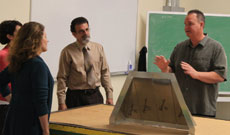PILMA Vows to ‘Redouble’ Support for Increased Protections Against Intellectual Property Theft
2011
WASHINGTON, D.C.—Labor and management in the biopharmaceutical industry will “redouble efforts at the federal level to support increased protections to fight intellectual property theft, counterfeiting and piracy, along with real enforcement measures to implement those protections.”
In a resolution [link to resolution] unanimously adopted by the trustees of the Pharmaceutical Industry Labor-Management Association (PILMA), the group applauds the ongoing efforts by labor and industry to erect strong intellectual property protections and to enforce those standards vigorously. The resolution points out that the pharmaceutical sector is “one of the few manufacturing industries that still maintains a significant employment footprint domestically, supporting more than 3.2 million American jobs.”
As part of this commitment to intellectual property rights, PILMA has been advocating for years in support meaningful reform of the United States’ patent system. PILMA commended Congress’ recent passage of the America Invents Act as an important step in the right direction. Looking forward, PILMA will increase its advocacy efforts on behalf of the PROTECT IP Act, a bill that will strengthen enforcement against rogue websites that sell counterfeit products, including unsafe medications.
“PILMA will join ongoing collaborative efforts—both within the business community and the trade union movement—to protect our knowledge-based economy, innovation industries and affected U.S. workers by fighting intellectual property theft, counterfeiting and piracy at every level,” the resolution declares.
Chaired by Michael Sullivan, former President of the Sheet Metal Workers International Association, PILMA is composed of unions and employers in the pharmaceutical industry working together to promote industry employment, innovation and legislation affecting working families.


